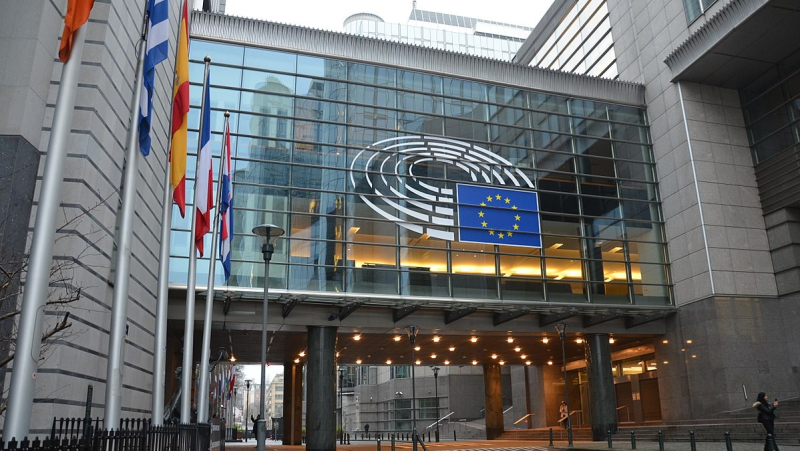EU Due Diligence Directive deal: a missed opportunity to advance better outcomes for people adversely affected by bank finance
Giulia Barbos, Human Rights Researcher and Campaigner, BankTrack

Giulia Barbos, Human Rights Researcher and Campaigner, BankTrack
Last month the final political discussions on the European Union’s Corporate Sustainability Due Diligence Directive (CSDDD) concluded in Strasbourg. The agreement reached, which will now need to be finalised and endorsed by the European Parliament and the Council in the coming months, aims to ensure companies identify and manage the impacts of their activities on the environment and human rights. If approved, the legislation will be an important milestone in advancing corporate accountability in Europe and beyond. However, EU political negotiators missed the mark by largely giving the financial sector and banks a free pass.
Under the provisionally agreed CSDDD deal, banks and asset managers like insurance companies and pension funds, are largely excluded from human rights and environmental due diligence obligations, in clear conflict with international standards such as the UN Guiding Principles on Business and Human Rights and the OECD Guidelines for Multinational Enterprises. The due diligence requirements for financial institutions only apply to their own operations, and not to their provision of finance, where most of their negative impacts arise.
In limiting the proposed legislation’s scope in this way, the EU has overlooked civil society’s persistent warnings on the risks of excluding financial institutions, as well as the wealth of evidence demonstrating the harms that arise when banks finance problematic projects and clients.
Back in October 2022, BankTrack together with our partners highlighted the risks of not holding the financial sector to the same standards as other industries and urged the inclusion of due diligence requirements for key financial activities like lending and investing. Global Witness further emphasised the point in a harrowing piece that showed how the tragic events around the Agua Zarca project in Honduras, including the murder of Berta Càceres, could have been prevented if a strong law mandated due diligence requirements for its EU-based financiers.
Even the United Nations Working Group on Business and Human Rights, the group of UN experts charged with promoting the Guiding Principles, intervened to caution against unjustified carve-outs for the financial sector and emphasise the importance of alignment with international standards for robust legislation. More recently, together with partners we echoed these concerns in a letter to EU Member States and EU Commission, another letter to the Committee of Permanent Representatives (COREPER), and in a final appeal to Justice Commissioner Didier Reynders.
In leaving out downstream due diligence requirements for the finance sector despite all these appeals, negotiators seem to have succumbed to lobbying from a finance sector that looks eager to protect the status quo of impunity.
Since the deal was announced, other civil society groups have also called the EU out on this. For example, ShareAction labelled the agreement as “a free pass” for financial institutions to continue harming human rights and the environment. In a similar vein, the WWF defined the deal as “an insult to people and communities” affected by EU-based financiers, with the European Coalition for Corporate Justice (ECCJ) concluding that “the journey to fight against corporate impunity is far from over yet”.
These exclusions notwithstanding, the CSDDD remains an important and necessary legislative development – and as a victory for the half a million EU citizens who advocated for this law. And although the outcomes for the finance sector are largely disappointing, there are positive aspects here too. For example, banks and other financial institutions are captured in Article 15 of the Directive, which requires companies to adopt Paris-aligned transition plans with clear reduction targets for their financed emissions. This is likely to lead to stronger climate action than the net-zero pledges that banks are currently committing to voluntarily, which have so far largely acted as a smokescreen for effective climate action.
However, banks and other financial institutions are exempt from civil liability, meaning they cannot be held liable in court for failing to comply with these climate goals.
Overall, the agreement reached on the CSDDD is a missed opportunity that risks giving banks carte blanche to continue financing projects and companies that have severe adverse impacts on communities and the environment. Although EU negotiators hinted that the due diligence obligations for the financial sector might be expanded at a later stage during a first review of the law, or that a new Directive specifically targeting the finance sector might be considered in the future, people affected by bank finance cannot afford further delays.
This outcome is particularly disappointing at a time of crisis, not only for the climate and the natural world, but also for human rights globally. Civil society groups such as BankTrack will now need to redouble their efforts to hold banks and financial institutions to account for the harms they finance, be it through existing channels like the OECD’s National Contact Point system or through new channels like our own Equator Complaints website. And we will take every available opportunity to expose the ways in which banks continue to knowingly facilitate companies and regimes that exacerbate these crises, as well as pushing for future legislation that does not leave the finance sector off the hook.
